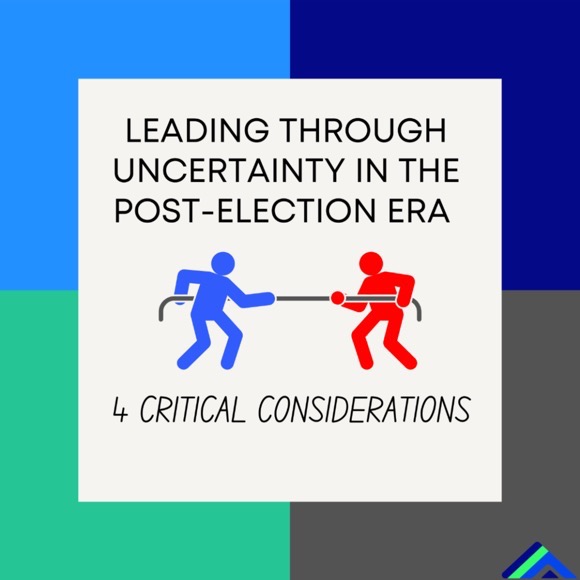Over the years, we have discussed “leading change,” “managing complexity,” “transforming conflict into curiosity,” and so many other leadership principles germane to our work.
In the past week, all of these accrued strengths, and many more, have been called upon to navigate an extremely polarized climate compounded by a wide range of opinions and emotions.
As leaders, we are undoubtedly committed to our missions. Our teams look to us as sources of truth, compassion, and guidance. However, for many of us, this level of divisiveness is new leadership territory.
So, what do you do? How should you feel? Is this a time for unity or staunch advocacy? Or both? Should you say something? Should you send out a message? What about your own self-care and sustainability?
Here are 4 Critical Considerations that can help anchor your leadership in a solid foundation during an extremely complex time.
#1: You are a Human Before You are a Leader
Earlier this year, I posted a message about the necessity of self-care and reflection to mitigate the risk of “DEI Fatigue” and burnout intrinsic to this domain of leadership. Now is a great time to review that resource again. The varied sentiments, reactions, and realities don’t just impact your patients and teams; they also impact you, your families, and your communities. Give yourself grace and seek support in a way that works best for you.
#2: Communicate with Intention
Should you send out a message to your constituents? If so, what should it say? Many ODLC members have asked these questions. My answer? It depends.
Quick tips to figure this out:
- Understand the goal of your communication. Do you want to provide reassurance? Offer support? Signal acknowledgment? Share available support resources? All of the above? If you are unclear about why you are sending a message, think about your goals before you hit “send.”
- Inquire about other communications. What other messages have been sent that are reaching your audience? Read those and ensure that you have an aligned message amongst leaders.
- Know your audience. Will you communicate with your smaller committee, larger department, or the entire system? If one segment hears from you regularly, what would be the impact of your silence? Each audience will require a slightly different tone and level of direction. Be mindful of this.
- Emphasize values of respect, civility, professionalism, and compassion. Enough said.
If you are part of our new ODLC Professional Membership Level, then you may have already unlocked our on-demand video on “Communication Strategies: Using Words that Work” and learned how to achieve the impact you desire (and avoid a communication misfire).
UPGRADE: ODLC PROFESSIONAL LEVEL
#3: Amplify Unifying Leadership
Polarization around politics and societal issues is not new. However, for several reasons, the current level of divisiveness is exponentially heightened, and it is important for us to evolve our approach to leadership. Some landmark articles have tackled the concept of being a unifying leader during turbulent times, and the takeaway is that it’s NOT easy.
In this recently posted audio interview with the Harvard Business Review, Karthik Ramanna, a professor at the University of Oxford, offers 3 reasons why organizations are facing a high-temperature climate of crisis, providing ways leaders can gracefully navigate the challenges through understanding and realistic engagement. I personally found this fascinating and helpful in anchoring my strategy for unifying leadership.
LISTEN: HBR Unifying Leadership
#4: Understand Mega-Threats
A few years ago, I introduced ODLC to the concept of “Mega-Threats,” a term coined by Duke Fuqua School of Business Professor Angelica Leigh. In this post-election time period, I am saddened (gross understatement) that we are already seeing episodes of targeted actions on local and national scales that can certainly be categorized as Mega-Threats.
As a refresher, “Mega-Threats” are 1) incidents that are negative, 2) receive intense media attention, and 3) are intrinsically linked to the victim(s) identities (race, gender, sexuality, immigrant status, etc.). Think: George Floyd, Breonna Taylor, Trayvon Martin, Atatiana Jefferson, Colorado’s Club Q, Atlanta-area spas, the recent racist text-bot messages around slavery, and too many more.
These events negatively impact members of our teams and our patients who have similar identities to the victims, bringing about feelings of threat and the enormous stress of wondering, “Am I Next?” This can result in an inability to work, avoidance of tasks, and general disengagement.
I encourage you all to review this summary article on this phenomenon and consider how you can contribute to healing and the discovery of a path forward.
These are four Critical Considerations—we know that there are so many more that I could have shared. ODLC is rooted in our collective success and well-being. Please do not hesitate to contact us with any questions or requests for consultative dialogue or support.
Lean on Us, and I will Lean on You,
Dr. Erica Taylor
ODLC Founder


